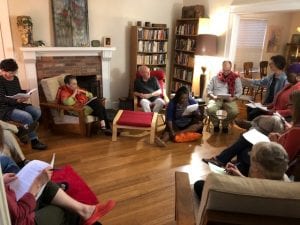April 10. . . Madness
What I’m ever grateful for is that so many wonderful actors and dancers, directors and dramaturges enjoy working on my scripts, even in the early stages.
This week is the first table read of Madness, the first time this brand new script will be heard out loud. Everybody listening knows it’s going to change, a lot, for years. I’m glad to have a trusted team of actors and listeners, who I know will tell me what is working, what isn’t – and help me find the many ways that I can make it better.
Madness is the biggest cast I’ve ever wrangled, with seven speaking parts, six dancers and two onstage musicians. It’s a carnivalesque, gender-fluid celebration loosely spurred on by A Midsummer Night’s Dream, but concentrating on the humans, who always get short shrift.

An amazing cast is gathered in our living room – Fanni Green and Jim Wicker are a long-married pair of former soldiers who run a carnival. Ned Averill-Snell is their grown child, who’s shifting between genders. Eugenie Bondurant and Lisa Powers Tricomi are women playing men, Chris Rutherford is a man playing a woman, Stephanie Roberts is the only woman playing a woman who’s not armed with a dagger, and voice actor Robin Gordon is our storyteller for the many silent visual moments.
It’s the quickest play I’ve written so far, started in October during one of four Chicago Dramatists online classes Matt and I took last year with the outstanding dramaturg, playwright and teacher, Dana Lynn Formby. I was writing a play about aging doo wop singers during class, but her structure techniques were so helpful that I started Madness alongside it.
I’m always a little nervous, but more so this time since the story is so offbeat and the casting is a little startling. We share supper, because you always feed people when they’re sharing their time and skills. And then we gather a small crowd of listeners, including the director of our future workshop, Dan Granke – and our choreographer, Paula Kramer.

It’s a friendly and forgiving bunch, but I know they’ll be honest. A friend once said to me they’d love to hear my new script so they could tell me it’s great. But that’s not what I need right now – I need to know what needs fixing.
The actors are terrific. They’re all pros and longtime friends who rarely get a chance to work onstage together, so a table reading or a workshop is a lovely way to work with pals you enjoy and respect. I’m reading along as I listen and marking places that need tightening up and lines that get a big laugh – gratifyingly, more than I expected.
We follow a variation of the Liz Lerman Critical Response Process for post-show feedback – first ‘what resonated with you?’ Then, ‘Where did you get lost or lose interest?’
After a reading of The Burlesque Astronomy Play last year at Chicago Dramatists, Dana Formby boiled that method down to three simple and surprisingly effective questions. . . What did you love? What did you wonder about? What did you wish?
As ever, I get useful feedback that will help me shape the next draft and dig deeper into angles that I hadn’t thought about. Much to my surprise, the gender-fluidity and reverse-gender casting doesn’t cause comment – everyone enjoyed it. And the pair of guys played by Eugenie and Lisa pretty much stole the show.
I’m glad to hear everyone agree that the heart of the script, and what grounds the wildness – is the aging pair of former soldiers Fanni and Jim play, trying to spice up their too-comforting marriage.
On to the rewrites. . .




